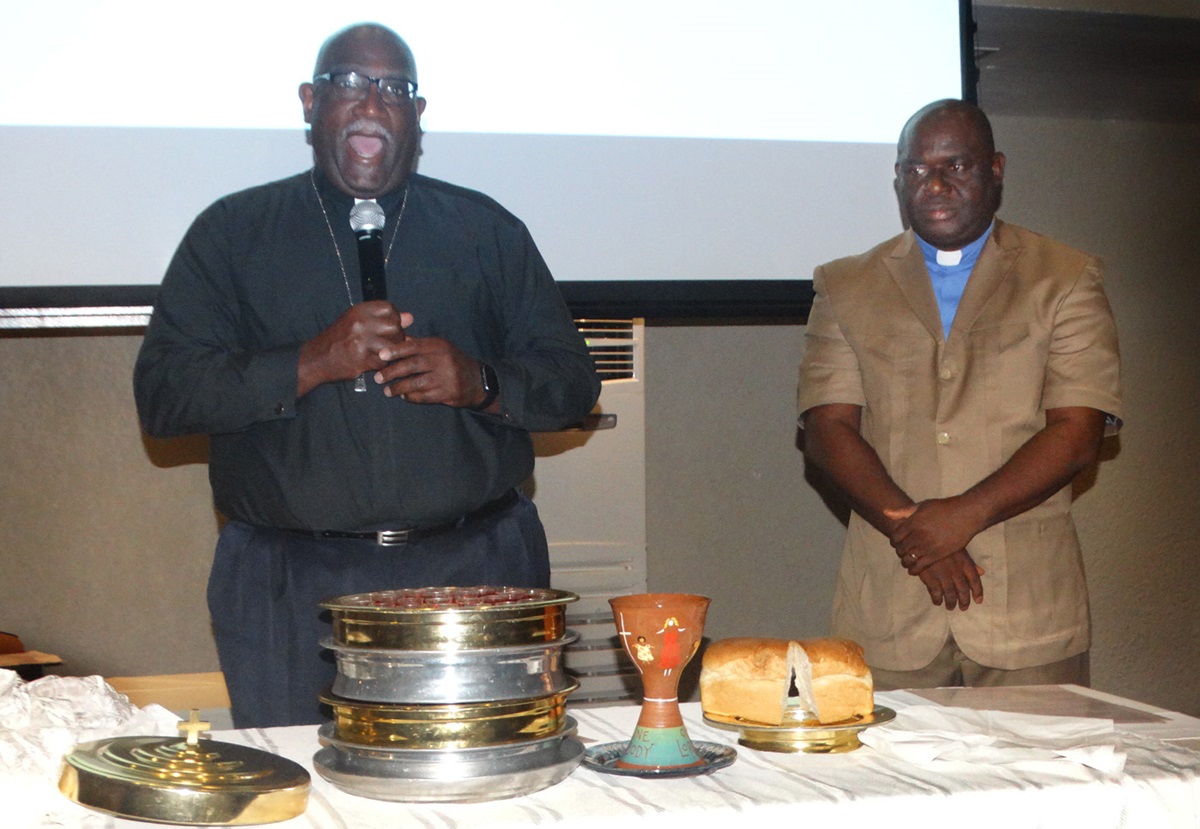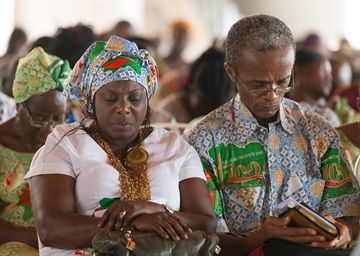A group of church leaders wrestling with where to put five new African bishops considered presentations about areas where growth indicates the need for a new episcopal area.
“I didn’t come with the expectation that there would be finality at this meeting,” said Bishop Gregory V. Palmer, chairman of the standing committee’s Africa Comprehensive Plan subcommittee. “I think some things are moving from blurring into focus that are very helpful to the committee.
“It feels like there is more energy from the people that are in the consultations that we move beyond the three existing central conferences. So I can imagine that that might be a part of a recommendation,” Palmer said.
Africa currently has three central conferences, and all include multiple countries and languages.
The presentations were made at an Aug. 30-Sept. 1 meeting in Freetown, Sierra Leone, that included a delegate from each African annual and provisional conference, all active African bishops and part of the Standing Committee on Central Conference Matters. The same leaders held a similar consultation last year in Harare, Zimbabwe.
The 2016 General Conference — the denomination’s top lawmaking body — approved legislation to increase the number of African bishops from 13 to 18.
Palmer was clear at the outset that the subcommittee would not make a recommendation at the Sierra Leone meeting. The goal of the meetings in Africa was to ensure that the insights of Africans were considered.
The full standing committee, a General Conference committee that continues to meet between legislative sessions, will meet in March 2019. After that meeting, the committee will make a recommendation on placement of the five new African bishops to the General Conference 2020. General Conference will make the final decision.
The subcommittee spent time considering the scenarios and statistical data from each central conference.
“We are making a recommendation to the General Conference… . We don’t intend to leave here with a decision. I just want to make that very clear,” said the Rev. Amy Lippoldt, a standing committee member.
Lippoldt led the discussion on the three main scenarios for placing the five new bishops.
The presentations of the 13 episcopal leaders showed the need for more bishops in Africa, but it is not clear that there is any understanding among the bishops as to where the additional bishops would be assigned.
General Conference will consider the number of clergy, number of charges, churches, size of the area covered and professing members of annual conferences in deciding where to put the new bishops.
Presentations by Nigeria, North Katanga and South Congo in the Democratic Republic of Congo, Mozambique and Zimbabwe supported their need for additional bishops.
In North Katanga, baptized membership rose by 2,642 from 1,209,549 in 2017 to 1,212,191 in 2018, and there were 12 new clergy. Preaching points increased from 640 to 1,069. A preaching point is a gathering for worship that does not have a church building, but may be under a tree, in the home of a church member or in a building such as a school.
The Nigerian church has maintained a sustained growth of 15 percent a year since 1984. In that time period, The United Methodist Church in Nigeria has grown from one provisional conference to four annual conferences; from 28 to 785 pastors; from 15 districts and 180 charges to 52 districts and 900 charges with about 162 preaching centers; and from 145,000 in membership to 742,652, said Nigeria Area Bishop John Wesley Yohanna.
Rapid national population growth, United Methodist programs that have affected people’s lives and a revived interest of young people in United Methodism are among other factors behind a projected 18 percent growth by 2030, Yohanna said.
There are almost 3 million lay United Methodist members in four episcopal areas in the Democratic Republic of Congo. Of these, 1,117,000 are in the South Congo-Zambia Episcopal Area, which has five conferences and 52 districts. It takes the bishop almost seven weeks to preside over the five conferences because of long distances, logistics, cultural and language challenges.
The Mozambique Episcopal Area covers North and South Mozambique, South Africa and Swaziland with strong missionary potential in Madagascar. The area has about 160,262 United Methodists. According to the presentation, ministry with just one bishop is a challenge even within Mozambique alone.
Other issues to be considered include finances and the challenges that come with initiating a new episcopal area. The General Council on Finance and Administration presented the global United Methodist financial report on income and expenses that affects bishops, especially in Africa.
Eastern Congo Area Bishop Gabriel Yemba Unda gave a talk on his experience in the newest episcopacy in Africa.
Bishop Palmer said there is no doubt Africa needs more bishops and said the reason only five are being consider is because “that is what the General Conference has authorized.”
“I would concur possibly that the need exceeds five,” he added. “I don’t have a number. So whether the number is six or seven, I don’t have that. But I can imagine that more could be needed, but you have the other concerns or considerations of what’s the capacity financially of the apportioned dollar to support starting a new episcopal area.”
Sierra Leone Area Bishop John Yambasu agreed. “We have not reached a conclusion on that. But this is part of the planning process.” He said there will be further discussion among African bishops at the November meeting of the Council of Bishops.
The African College of Bishops previously recommended to the standing committee the creation of seven central conferences in Africa.
The Rev. Kah-Jin Jeffrey Kuan noted that some representatives of different conferences were saying other areas had greater needs than their region.
“It was interesting that, in some of our small groups, we were hearing from our representatives that were saying that ‘We know we have needs, but this area has greater needs. So, we are ready to let that area create the episcopal area in that region in the next quadrennium,’” said Kuan, a member of the Africa Comprehensive Plan subcommittee.
Jusu is director of communications for The United Methodist Church in Sierra Leone.
News media contact: Vicki Brown at (615) 742-5470 or newsdesk@umcom.org. To read more United Methodist news, subscribe to the free Daily or Weekly Digests
Like what you're reading? Support the ministry of UM News! Your support ensures the latest denominational news, dynamic stories and informative articles will continue to connect our global community. Make a tax-deductible donation at ResourceUMC.org/GiveUMCom.




